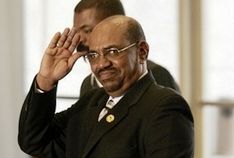Sudan humiliated as Ghana takes African Union helm
Jan 29, 2007 (ADDIS ABABA) — Sudan suffered a double humiliation after the African Union summit opened when it was snubbed in favour of Ghana for the AU presidency and lectured by UN chief Ban Ki-Moon over the conflict in Darfur.

“I wish to express my gratitude to all of you, my brothers, for appointing me as the head of our union,” he said after the decision was formally announced.
“Your decision is quite clearly a mark of confidence, a recognition of the fight of my country for democracy, good governance and the fight against poverty.”
The vote means that Ghana, the first African state to gain independence, will head the organisation on the 50th anniversary of nationhood, which the west African country celebrates in March.
Sudan’s Foreign Minister Lam Akol tried to play down the setback, saying Khartoum agreed with the decision.
“The choice is good. Sudan has voluntarily accepted to decline in favour of Ghana. Ghana is a great country,” he said. “We chose Ghana to maintain the unity of the continent.”
The summit, held amid massive security in the Ethiopian capital, was also focusing on efforts to put together a peacekeeping force for lawless Somalia as well as issues such as global warming and the 2010 World Cup in South Africa.
The situation in Darfur, however, dominated both the build-up to the summit and its opening sessions.
As late as Sunday night, the Sudanese delegation was saying it saw “no other scenario” to taking the helm of the AU, after reluctantly agreeing to step aside at the previous summit in Khartoum.
But President Omar al-Beshir, possibly sensing a defeat on Monday, told AFP before the vote there would be “no problem” if Sudan were not elected chairman.
“If they don’t allow it to us, it is no problem. We have not discussed about it yet but we will,” he said.
Human rights groups had expressed outrage at the idea of Khartoum assuming the presidency, given its record in Darfur.
New UN Secretary General Ban Ki-Moon, who met Beshir on the sidelines of the two-day summit, slammed “terrifying bombardments” of Darfur by Khartoum’s forces in his speech to the summit.
Pushing for deployment of a robust joint AU-UN force in Darfur, Ban stressed “the partnership between the AU and the UN is of central importance” to end the conflict.
“Together we must work to end the violence and scorched-earth policies adopted by various parties, including militias, as well as the bombings which are still a terrifying feature of life in Darfur,” he said.
Ban later said that his meeting with Beshir had been productive.
The UN wants to send troops to bolster a struggling AU peacekeeping force already in Darfur but Khartoum is trying to limit the UN presence to a supporting role.
“We agreed to accelerate the joint AU-UN efforts for the political process and cooperation for peace-keeping mission” based on previous agreements which the UN feels have not been honoured.
Beshir had “reiterated his strong commitment to implementing these agreements” Ban added to reporters.
AU commission chief Alpha Oumar Konare had earlier told the summit in his opening speech that both the Sudanese government and rebel forces should “stop the bombardments and massacres” in Darfur, where the UN estimates some 200,000 people have been killed since 2003.
UN sources had said they expected Sudan would be more amenable to pressure if it were elected to chair the AU, believing a diplomatic snub might leave it even more isolated.
Konare also used his speech as an opportunity to urge more countries to join a planned peacekeeping mission to Somalia, warning of chaos if the force was not deployed rapidly.
The African Union has given the green light to a force of nearly 8,000 soldiers to go to Somalia but only a handful of countries have committed troops.
Italian Prime Minister Romano Prodi also told the gathering that Rome stands ready to host a peace conference for Somalia once stability returns to its former colony.
(AFP)
